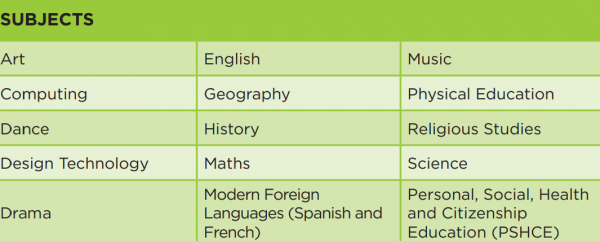OUR CURRICULUM
Curriculum Vision and Intent
We teach a rigorous knowledge-rich education, to all pupils, irrespective of background. This curriculum introduces pupils to the best and most important work in the humanities and sciences. Our aim is to prepare children to fully participate in conversations and debates about contemporary issues, as well as the universal questions that have been troubling humankind throughout history. We want pupils to leave our school with the confidence that comes from possessing a treasure trove of essential knowledge, as well as a deep and lasting respect for reason, evidence, civility, honesty, kindness and the value of hard work and self-discipline.
Our Academy curriculum vision is: “Excellence for all”
We believe that every child, regardless of their background or prior achievement, can excel if given great teaching and effective pastoral support.
Parents can find brief overview to our curriculum content in the subject plans link here.
Overarching Principles
· We deliver an ambitious and rich curriculum for EVERY student.
· A 5 Year curriculum design approach for most subjects providing a logically sequenced educational journey.
· We follow the full National Curriculum at Key Stage 3 (KS3) to give our students the broadest and best start to their secondary education.
· All students are taught two languages (Spanish and French) weekly in Year 7 and then focus on one chosen language to encourage fluency.
· We believe in personalisation and choice, so we offer one of the broadest ranges of KS4 GCSE option subjects in the Borough.
· Students are encouraged, but not forced to take EBacc subjects, resulting in significantly more students choosing these subjects, compared to National average
· All students acquire academic, subject specific vocabulary. They can talk confidently, accurately and publicly about what they have learnt.
· The ‘Academy Literacy Strategy’ ensures that this is a core strand running through the curriculum
· All students, at every stage, acquire and retain the knowledge they need to succeed and to move forward to the next stage including progression to higher education.
· We have a ‘Teach to the Top’ mantra, where challenge is always present and adaptation ensures all students have the scaffolding and support to ‘Access the Top’
· We pride ourselves on an extremely rich ‘wider curriculum’ including extracurricular; electives; trips and visits; values; oracy to increase our students’ ‘Cultural Capital’ to ensure all students are equipped with the knowledge, skills and experiences to become good citizens and lifelong learners.
· We base our curriculum design and implementation on proven educational research methods.
Implementing our Principles
· Each subject develops a long-term plan that explicitly lays out the knowledge and skills students are expected to acquire in order to achieve excellence. This content builds cumulatively in terms of its breadth and depth.
· Each subject clearly identifies the ‘end points’ that are necessary to become excellent in this subject and enable students to progress to the next steps and higher education.
· A range of formative and summative assessment strategies are used to ‘test’ these end points.
· A system of RETEACH after summative assessments ensures that all students have mastered key curriculum endpoints
· Regular retrieval practice, interleaving and low stakes testing is built into the curriculum to help students form durable long-term memories.
· CPD maintains an unrelenting focus on improving and evolving the curriculum, and ensures that all teachers are developing their subject pedagogical knowledge.
· Students are explicitly taught strategies for knowledge acquisition (memorisation, revision, self-testing etc.) to support students in self-regulating their own learning of the core knowledge.
· Homework is planned into the curriculum across all subjects. It provides students with the opportunity to practise, memorise, retrieve, extend upon or apply the knowledge that they have been taught in lessons, or provides the opportunity to act on feedback to improve a piece of work.
Our Wider Curriculum
· Homework Club runs for all students on Tuesdays, Wednesdays and Thursdays until 4;20pm. This provides a supervised space and access to the library to support students.
· Inspirational Trips and Experiences We believe that learning should be inspirational both inside and outside the classroom. This is why we plan an extra ‘trips or experience’ These include trips residential trips to Spain, France, Germany, Iceland, New York and others. Day trips to Kew Gardens, museums, theatre etc..; Video Conferences; visiting speakers, orchestras and much more!
· Extracurricular Programme Our extensive club timetable boasts many different clubs this year and the list is growing all the time. Clubs are at lunchtime and after school and are all free and voluntary. Students can have support to prepare for exam courses, extend their Maths skills; debate against local schools; play sports for fun or competitively; enhance their chess master skills; audition for the next Academy play… The range of clubs is awesome!
· Values and Character Education Students are taught explicitly about our 3 core values of hard Work, kindness and high standards. In addition, students have numerous
opportunities to develop their character for example as members of the Junior Leadership team, Maths ambassadors or reading mentors.
· Duke of Edinburgh Award We became an official DofE school in 2020 and have gone from strength to strength. We have had over 200 students gain the Bronze award and are celebrating our first students who have gained Gold in the sixth form.
Right to Withdraw from RE
In England and Wales, parents have the statutory right under Section 71 of the School Standards and Framework Act 1998 to withdraw their children from RE lessons and acts of collective worship in schools. Parents are not obliged to provide a reason for requesting withdrawal.
Before exercising this right, we encourage parents to discuss their concerns with Senior Leadership. If a student is withdrawn from RE lessons, they will be directed to alternative lessons in a different class. Requests for withdrawal must be made in writing.
Summary KS3 Curriculum in Years 7 & 8

Summary KS4 Curriculum in Years 9-11






